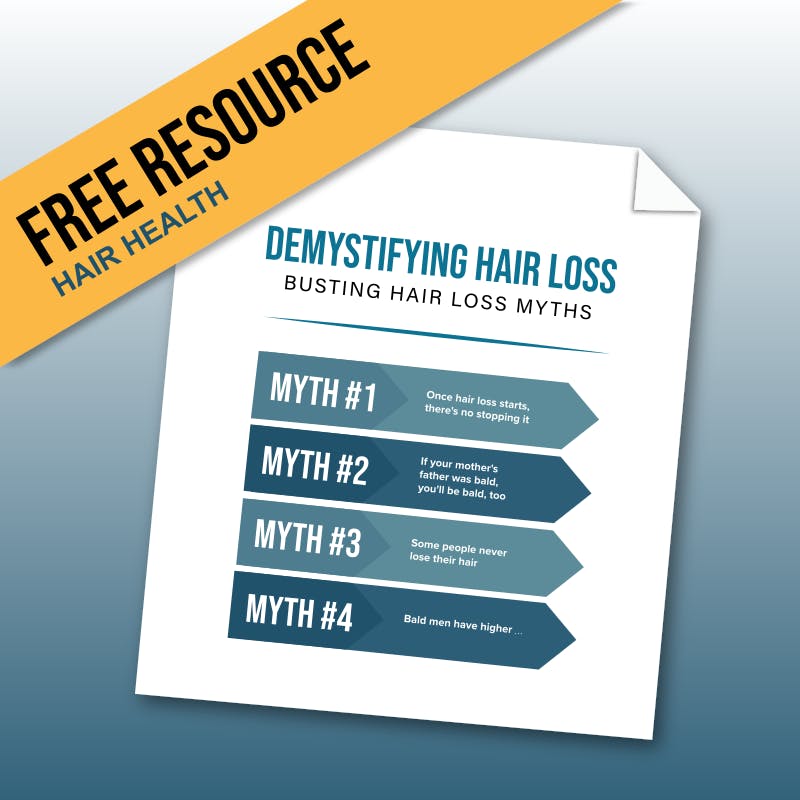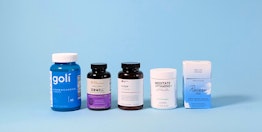Could your diet be causing hair loss?
Many men worry about hair loss, feeling like it’s out of their control. Dermatologists weigh in with tips on how to be proactive.

We all know that our lifestyle choices matter, including what food we put into our bodies. But while there’s no questioning the value of maintaining a healthy lifestyle, it’s not always clear what that should look like — especially when trying to tailor those habits to manage a specific health concern, such as hair loss.
Are there certain foods that help promote hair health and growth? Can others do more harm than good? And if so, to what extent is hair loss management truly within your control?
To get to the bottom of these pressing questions and clear up common misconceptions around hair loss, we contacted expert dermatologists and dieticians to learn how nutrition influences hair health.
Jump to:
Understanding your hair loss
While a common misconception is that hair loss only happens once you reach midlife, it can impact men of all ages. On some level, hair loss is always happening and can’t be avoided. According to the Cleveland Clinic, most healthy people lose up to 100 strands of hair each day.1 This shedding is part of your hair’s natural life cycle, which has four phases:8
- Anagen (growth)
- Catagen (regression)
- Telogen (rest)
- Exogen (shedding)
So, experiencing some shedding is perfectly normal. It’s only when new hairs aren’t growing back, or more than the usual amount of strands are shedding in a given day over an extended period, that men have reason for concern.
However, not all hair loss looks the same or has the same causes.2 Knowing what type of hair loss you’re dealing with will help inform what you can do to treat it. For example, male pattern baldness (androgenic alopecia) is hereditary and can affect anyone. Meanwhile, alopecia areata is an autoimmune disease and manifests as hair loss from both the head and body.1
Other types of hair loss can be triggered by life events, such as physical and emotional stressors (telogen effluvium) or medical treatments (anagen effluvium). Hair loss happens rapidly in these cases, and addressing the underlying cause also addresses hair loss.1
No matter which type of hair loss you’re dealing with, it’s important to speak with your doctor and seek treatment if you’re suffering and can’t get a good handle on the situation.
“Getting treated earlier is often better because, as you can imagine, it's easier to prevent further loss and regrow hair,” says Dr. Christina Han, a board-certified dermatologist who serves as the Director of Dermatology at False Creek Dermatology in Vancouver and the Medical Director of XYON Health.
“So, if men are experiencing hair thinning, then seeing a professional and getting treated early are all good things. Because it's always easier to prevent.”
The impact of nutrition on hair health
One way that men can prevent hair loss is by getting proper nutrition through a healthy diet.
“Healthy hair starts from the inside out. So, a good diet full of healthy fats and antioxidants is key in keeping hair follicles healthy and creating a healthy environment for hair to grow,” says Gretchen Friese, a Certified Trichologist at BosleyMD.
Dr. Han reaffirms this, “If you can think about hair, it's actually built with building blocks that are composed of protein and amino acids. And ultimately, you need to have the diet and the basic building blocks for optimizing that healthy environment for hair to grow.” But what exactly are these building blocks? Han elaborates, “Components like protein, carbohydrates, minerals, and vitamins really are the key building blocks of hair.”
When these essentials are missing, hair loss or thinning can ensue. For example, if you’re on a very low-carb diet (such as Keto or the Atkins diet), your body may not have enough energy to promote healthy hair growth.3
The growing emphasis on getting the right amounts of vitamins and minerals inspires many to explore supplements. But, although supplements can be helpful when a medical professional has diagnosed a specific deficiency, research suggests that over-supplementation can produce the opposite effect of what’s intended. One systematic review found that excessively taking nutritional supplements might actually cause hair loss.4 And a researcher notes that taking too many different supplements together could potentially cancel out their individual effectiveness.5
This isn’t to say that hair supplements (like Nutrafol) are dangerous; it just means that it’s vital to communicate with a medical professional before adding a new supplement to your daily regimen. Your doctor can also diagnose why your hair loss is happening in the first place and guide you in the right direction for finding a solution, whether it’s a supplement, topical, or prescription.
Lifestyle choices that can harm your hair
Just like there are building blocks of hair health, there are foods and substances that can sabotage it.
To learn about what should be cut out of diets to promote overall hair health, we consulted Michelle Routhenstein, M.S., R.D., C.D.N., who is a Preventive Cardiology Dietitian, Registered Dietitian Nutritionist, Certified Diabetes Care and Education Specialist, and the owner and president of Entirely Nourished, a virtual nutrition counseling and consulting private practice.
“Avoid highly processed foods like fast food, sugary snacks, and refined carbohydrates,” she says. “They lack essential nutrients and are high in unhealthy fats, sugars, and additives. These foods can lead to inflammation, disrupt hormonal balance, and contribute to insulin resistance, all of which are associated with hair loss.”
While avoiding processed foods, sugars, and refined carbs may be intuitive for some, other lifestyle choices may be less obvious, such as cutting back on alcohol. “Heavy alcohol use can cause dehydration and nutrient deficiencies,” explains Routhenstein, “hindering the absorption and utilization of essential vitamins and minerals crucial for healthy hair growth, including vitamin B12, zinc, and iron.”
Similarly, smoking is equally detrimental to hair health, notes Dr. Han, as it’s known to disrupt the normal flow of oxygen within our blood vessels, thereby limiting the amount of oxygen and nutrients that can get to hair follicles. Han also says that nicotine has been shown to stimulate a prominent hormone that miniaturizes hair follicles — accelerating male pattern baldness.
Ultimately, breaking unhealthy habits is just as imperative as starting new ones to improve your hair health.
What foods can help manage hair loss?
The good news is that we can decide to change our diets and habits at any minute, and there are specific foods that research indicates may help promote hair health and manage hair loss.
A 2022 research overview notes that plant-rich diets, such as the often-lauded Mediterranean diet, may foster hair growth and limit hair loss. The authors explain that this is due to the higher consumption of phytochemicals with anti-inflammatory and antioxidant properties that seemingly promote the secretion of hair growth hormones.
Below are our experts’ recommendations for plant-based foods to consider adding to your grocery list for better hair health.
- Beans
- Lentils
- Leafy greens
- Sweet potatoes
- Carrots
- Pumpkin seeds
Routhenstein reiterates just how important it is for hair follicles to get enough oxygen, and she explains that iron helps facilitate that process. “[Iron] can be found in foods like lean meats, beans, lentils, and leafy greens,” she says.
Getting enough iron is especially important if you’re vegan or vegetarian. A 2017 review explains that vegans and vegetarians require about 1.8 times more dietary iron than meat eaters because the iron in plants (non-heme iron) is less bioavailable than the type found in meat and fish (heme iron).6
Zinc is another essential, which Routhenstein says supports hair growth and repair. If you’re concerned about having a zinc deficiency or insufficiency, getting tested by your physician can be helpful, as hair loss caused by a lack of zinc can easily be reversed.6 However, you don’t need to go out and get a zinc supplement to ensure you’re getting enough; Routhenstein notes that pumpkin seeds and lentils are excellent sources of zinc, as is chicken.
Dr. Han and Routhenstein both remind us that hair health is about more than just getting enough minerals — it’s also essential to have a healthy scalp environment, which can be supported by vitamin intake. “Vitamin A stimulates sebum production, aiding scalp moisturization,” says Routhenstein. Adding foods like sweet potatoes, carrots, tomatoes, cantaloupe, and kale to your diet is a great way to prioritize your scalp health and get the vitamin A you need.9
As with all vitamins and minerals, overconsumption can be counterproductive. The Cleveland Clinic warns that too much vitamin A can contribute to hair loss, so it’s important to stay within the recommended amounts, which for men is 900 micrograms.7 Additionally, those with chronic kidney disease should avoid or limit their amount of supplemental vitamins A, E, and K (and potentially C).10 But, no matter your health status, consulting with a dietician or nutritionist can help you plan your new diet based on the amount of vitamins and minerals recommended for your unique circumstances.
Bottom line
Although making healthy changes to your diet can be an empowering step to managing hair loss, Dr. Han cautions that diet alone won’t facilitate the regrowth of hair that’s already been lost. “It will help maintain existing hair and optimize the scalp and the hair environment to optimize growth,” she says. “But pharmacologic agents like topical or oral medications may be necessary.” This is why making proactive lifestyle changes and seeking the help of a dermatologist who can offer guidance and pharmacological support is so important.
While strengthening existing hair and promoting hair growth are important goals, Dr. Han emphasizes that, at the end of the day, the most important thing is that you’re taking good care of yourself. “Having that support and awareness out there is a really important factor.”
Sources
Innerbody uses only high-quality sources, including peer-reviewed studies, to support the facts within our articles. Read our editorial process to learn more about how we fact-check and keep our content accurate, reliable, and trustworthy.
Cleveland Clinic. (2021). Hair Loss. Cleveland Clinic.
Gokce, N., Basgoz, N., Kenanoglu, S., Akalin, H., Ozkul, Y., Ergoren, M. C., Beccari, T., Bertelli, M., & Dundar, M. (2022). An overview of the genetic aspects of hair loss and its connection with nutrition. Journal of Preventive Medicine and Hygiene, 63(2 Suppl 3), E228–E238.
Nett, K. (2022). What you eat promotes healthy hair, skin and nails naturally. Mayo Clinic Health System.
Rushton, D. (2002). Nutritional factors and hair loss. Clinical and Experimental Dermatology, 27(5), 396-404.
Rajendrasingh, R. (2017). Nutritional Correction for Hair Loss, Thinning of Hair, and Achieving New Hair Regrowth. Practical Aspects of Hair Transplantation in Asians, 667-685.
Guo, E. L., & Katta, R. (2017). Diet and hair loss: Effects of nutrient deficiency and supplement use. Dermatology Practical & Conceptual, 7(1), 1-10.
Cleveland Clinic. (2022). The Best Vitamins and Supplements for Hair Growth. Cleveland Clinic Health Essentials.
Natarelli, N., Gahoonia, N., & Sivamani, R. K. (2023). Integrative and Mechanistic Approach to the Hair Growth Cycle and Hair Loss. Journal of Clinical Medicine, 12(3).
Harvard T.H. Chan School of Public Health. (2023). Vitamin A. The President and Fellows of Harvard College.
National Kidney Foundation. (n.d.). Vitamins and Minerals in Chronic Kidney Disease. NKF.




